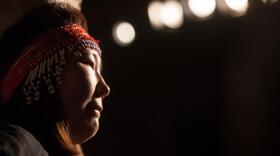Alaska Native and Tribal health organizations take the wellness of their communities pretty seriously. Many of them are taking a precautionary approach to coronavirus – but their biggest piece of advice is – don’t panic.
About 130 miles northeast of Fairbanks, in the city of Fort Yukon -- health providers at the Yukon Flats Health Center diligently wash their hands, use hand sanitizer -- and continue to pass along healthy hygiene recommendations to patients.
Debra McCarty has been the clinic director at the health center for about 10 years.
“We're pretty much up to this point -- business as usual,” McCarty said by phone. “We're ordering enough supplies so the staff can have handy wipes and gloves at their workstations and wipe them down themselves every day in addition to … the regular infection control that our janitorial staff are doing.”
The health center is a part of the Council of Athabascan Tribal Governments -- a consortium of 10 villages. Five of those villages fall under the health program, which McCarty says, serves about 1,200 people in the region.
The biggest hurdle the health center faces, she says, is combatting misinformation.
“Our main goal is just to kind of educate everybody, let them know what we're doing and that we're prepared,” McCarty said. “We're really trying to make sure that our community members, our patients and our chief and counsels are not getting overly paranoid and just kind of really listening to the facts and then getting their information from the CDC through us.”
McCarty says the health center has about two teleconferences daily, either from the Tanana Chiefs Conference, Indian Health Services or Alaska Native Tribal Health Consortium.
Currently, the health center can test for COVID-19, but they have to send it to the state to determine whether further testing is necessary.
“If there's a chance that somebody has COVID-19, they're going to self-quarantine at home and we're just going to treat everybody that way,” McCarty said. “And anybody who has any increased respiratory issues that need admission, well, obviously, medevac will be called and they'll be sent in."
McCarty says no programs or services have been suspended because of the potential for coronavirus. In Southeast Alaska though, some Elder programs are being temporarily suspended as a precaution.
The Central Council of Tlingit and Haida Indian Tribes of Alaska made the decision to suspend several social events for seniors through March. Tlingit and Haida wellness coordinator Justin Jones says the move was a proactive one -- to protect Elders from potential risk of illness.
“It's very much at the forefront of everyone's minds and the concerns. … So it just came down to making sure that they feel safe and we don't want to put them in a situation where they're concerned, where our staff would be concerned.”
In lieu of the regularly scheduled gatherings, Jones says Tlingit and Haida will deliver lunches to Elders – as well as, care packages of thermometers, soap and hand sanitizer.
“It's just really making sure that the Elders understand that we care for them and that they are valued," Jones said. "We're looking to have that from a health perspective. … And just keeping our personal health a top priority.”
Francine Eddy Jones is the director of Tlingit and Haida’s Tribal Family Services. She says there are other groups and gatherings for families that some Elders will participate in. But Tlingit and Haida plans to continue to assess the risk of illness and take as much precaution as possible.
“I think as a Native community is being proactive and taking precautions is definitely the message we'd like to give,” she said. “And I think how can we collectively do that across our Native communities is important.”
Tlingit and Haida wellness coordinator Justin Jones says once the tribe has more information, it will reassess whether -- and how -- future programs will be affected.
In Hoonah, Tlingit language teacher Lgéikʼi Heather Powell made signs instructing Hoonah City Schools students and staff in Lingit to wash their hands: i jín na.óos'
"My students will be posting them throughout the school today in an effort to be informed, and proactive," said Powell, who is also director of the Alaska Native education program Haa Kusteeyi Áyá, or This is Who We Are, for Hoonah City Schools.
Ḵaaḵal.aat Florence Sheakley, Ḵaanáḵ Ruth Demmert and X̱ʼunei Lance Twitchell also created a poster detailing the steps of proper hand washing.

Calls requesting comment from the Alaska Native Health Board and the Alaska Native Tribal Health Consortium were not returned in time for this story.



